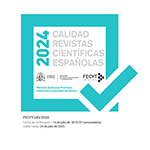What is hidden behind the category «unaccompanied Moroccan minors»: rampant fear, European contradictions and consecuences for Social Work
Abstract
Confronted with the presence of children who migrate on their own from Morocco to Spain, policies have become oriented towards repatriation, which poses ethical and theoretical problems. Social intervention with these children is marked in many ways by the category of «unaccompanied Moroccan minors» imposed on them. This label (a) implies a series of contradictions between their status as «minors» and as «foreigners», which places us squarely in the debates in the European Union about what it means to be «European»; (b) justifies repatriation on the basis of long-standing historical fears of Islam and Muslim culture; and (c) has practical and psychological consequences for the lives of boys and girls thus labelled and for the social intervention professionals working with them. We propose a reflection on all of these elements and to do so, utilize the concept of «menización1 of boys and girls»: how do bureaucratic administrations define, classify and manage these migrants and what are the consequences?Downloads
Article download
License
In order to support the global exchange of knowledge, the journal Cuadernos de Trabajo Social is allowing unrestricted access to its content as from its publication in this electronic edition, and as such it is an open-access journal. The originals published in this journal are the property of the Complutense University of Madrid and any reproduction thereof in full or in part must cite the source. All content is distributed under a Creative Commons Attribution 4.0 use and distribution licence (CC BY 4.0). This circumstance must be expressly stated in these terms where necessary. You can view the summary and the complete legal text of the licence.









